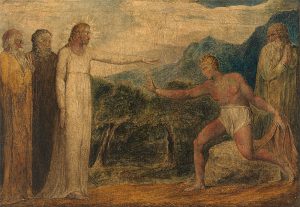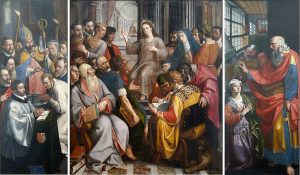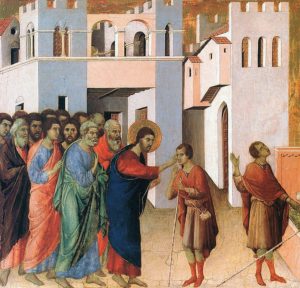Thoughts on Sunday’s Lessons for Oct. 27, 2024 (Pentecost 23B/Proper 25)

Christ Giving Sight to Bartimaeus (1799-1800), tempera, pen and black ink on canvas by William Blake (1757-1827). Yale University Center for British Art, New Haven, Connecticut. (Click image to enlarge.)
First Reading (Track One): Job 42:1-6, 10-17
The cosmic conversation between God and Job comes to its happy conclusion. Earlier we have heard Job angrily wondering why God would not respond to him. Then we saw Job standing awestruck as God spoke from a whirlwind about the magnificence of the divine creation, in comparison with which Job is tiny and insignificant. Now, in the last chapter of the book, Job responds. He quietly, faithfully accepts God’s power. Having seen and heard God, he can only despise himself, repenting in dust and ashes. But then the world turns and the story ends in restoration: God ensures that Job’s fortunes are double what they had been before. Job lives a long life amid riches, a big family and the respect of his friends.
First Reading (Track Two): Jeremiah 31:7-9
When God is with us, when God saves us; when God makes us well and showers grace upon us, we can hardly help but express our gratitude and joy with shouts of thanksgiving and praise. Hold this theme of gratitude and grace as we reflect on Sunday’s readings. First, we turn to Jeremiah after having heard Isaiah’s meditation last week on Israel’s Suffering Servant carrying the pain of exile. Now we hear Jeremiah speaking to Israel in exile with loving words of comfort and joy. God will bring the remnant of Israel out of exile, the prophet foretells. The weak and the strong, mothers and children, those who can’t see and those who can’t walk, all will return home together, weeping with joy, praising God and giving thanks.
Psalm (Track One): Psalm 34:1-8, (19-22)
A good thematic fit with the Track One readings for the day, this portion of Psalm 34 meshes nicely with the story of Job. Titled “Praise for Deliverance from Trouble” in the New Revised Standard Version, it begins with a song of praise, singing our intention to bless and praise God at all times. When King David, imagined as the author of this Psalm, found himself in a dangerous place, he prayed for deliverance from his terror. God indeed saved him from all his troubles, and he responded with joy: “Taste and see that God is good; happy are they who trust in the Most High!”
Psalm (Track Two): Psalm 126
The pain of exile and the joy of return resonate through many of the psalms, as they do in Psalm 126. Its joyful verses harmonize with Jeremiah’s hopeful prophecy of return and repose. The Psalmist celebrates Israel’s restoration on Mount Zion, the home of the Temple in Jerusalem: “Then was our mouth filled with laughter, and our tongue with shouts of joy.” In a striking agricultural metaphor, the people sing in memory of ancestors who sowed with tears but reaped with songs of joy. They went out weeping, carrying seed, but then brought home ripe sheaves of grain, joyfully shouting thanksgiving.
Second Reading: Hebrews 7:23-28
Seeking to bring Jewish converts back to the infant church, the author of Hebrews compares Judaism unfavorably to Christianity in words that sound less than generous to modern ears. These verses, building on those that went before, declare that Jesus is a far greater high priest than the old high priests of the Temple: The Jewish high priests were mere mortal, sinful humans, who had to purify themselves repeatedly through constant sacrifices because they were weak. Unlike the other high priests, this passage concludes, Jesus has no need to offer sacrifices day after day: Jesus did all this for everyone when he offered himself.
Gospel: Mark 10:46-52
Like other disabled people in Jesus’s time, a blind person had little option but to beg for basic sustenance. Their neighbors often assumed that their disability was punishment for some grievous sin. Even now, physical blindness remains an enduring metaphor for willful refusal to “see” or believe. So Bartimaeus’s neighbors had little but pity to offer Bartimaeus as he sat at the side of the Jericho road begging for alms. So when Bartimaeus heard Jesus passing by, he yelled as loud as he could, asking Jesus to have mercy on him. Jesus listened and healed him, declaring that his faith had made him well. And Bartimaeus, his sight restored, chose to follow Jesus.


